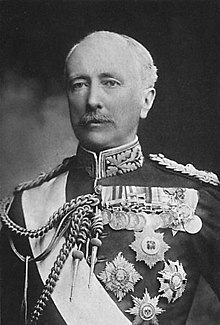Garnet Wolseley, 1st Viscount Wolseley
| The Viscount Wolseley | |
|---|---|

Field Marshal Lord Wolseley
|
|
| Born |
4 June 1833 Golden Bridge House, Dublin, Ireland |
| Died | 25 March 1913 (aged 79) Menton, France |
| Buried at | St Paul's Cathedral, London |
| Allegiance | United Kingdom |
| Service/branch | British Army |
| Years of service | 1852–1900 |
| Rank | Field Marshal |
| Commands held |
Commander-in-Chief of the Forces Commander-in-Chief, Ireland Adjutant-General to the Forces Quartermaster-General to the Forces |
| Battles/wars |
Fenian raids |
| Awards |
Knight of the Order of St Patrick Member of the Order of Merit Knight Grand Cross of the Order of the Bath Knight Grand Cross of the Order of St Michael and St George Volunteer Decoration Mentioned in Despatches Order of the Medjidie (Ottoman Empire) Order of Osmanieh (Ottoman Empire) Legion of Honour (France) |
| Other work |
Governor of the Gold Coast Governor of Natal Governor of Transvaal |
Fenian raids
Red River Rebellion
Third Anglo-Ashanti War
Anglo-Zulu War
1882 Anglo-Egyptian War
Field Marshal Garnet Joseph Wolseley, 1st Viscount Wolseley KP, GCB, OM, GCMG, VD, PC (4 June 1833 – 25 March 1913) was an Anglo-Irish officer in the British Army. He became one of the most influential and admired British generals after a series of successes in Canada, West Africa, and Egypt, followed by a central role in modernizing the British Army in promoting efficiency. He served in Burma, the Crimean War, the Indian Mutiny, China, Canada and widely throughout Africa—including his Ashanti campaign (1873–1874) and the Nile Expedition against Mahdist Sudan in 1884–85. Wolseley served as Commander-in-Chief of the Forces from 1895 to 1900. His reputation for efficiency led to the late 19th century English phrase "everything's all Sir Garnet", meaning, "All is in order."
...
Wikipedia
